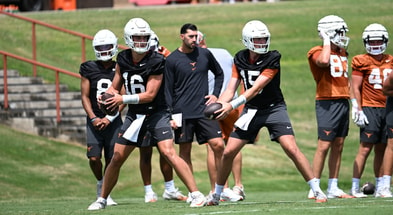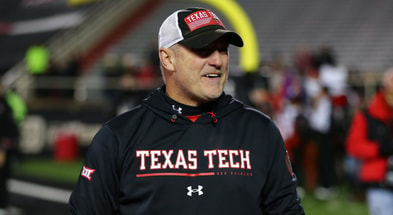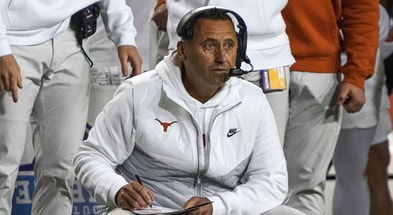[caption id="attachment_31963" align="alignleft" width="300"]

Jeff Traylor. (Will Gallagher/IT)[/caption]
If you’re surprised, angry, or depressed by the amount of money Texas football’s assistant coaches make — don’t be.
Most of us don’t make our living atop Fortune 500 companies, so a salary upwards of $400,000 is the kind of thing dreams are made of. In fact, making that much money annually puts someone near (or in) the top 1%. It’s understandable a football coach earning that much, or considerably more, will illicit a myriad of different responses.
Some will protest on principle: “Shouldn’t the university’s professors make more money than the university’s coaches?”
Some will protest out of jealousy or honest ignorance: “Why does a football coach deserve to make so much money?”
Regardless of how you feel about it; college football is big business. Wherever there are large profits, large paychecks will be the reward.
In 2015, Forbes ranked the Texas Football program to have an overall value of $152 million. That’s up 16% from the previous year. In a distant 2nd place is Notre Dame (worth a “mere” $126 million, respectively). I’m glad the “upper crust” of college football will further their rivalry on the field again in 2016.
As long as college football’s bottom line continues to grow, as it has every year in recent history, coaching salaries will continue to grow as well. Just consider how drastically different Texas pays its own staff now as compared to merely six years ago.
In 2010, offensive coordinator Greg Davis made $477,084. To many fans Coach Davis was public enemy #1; he was also the most prolific QB coach in Texas Football history (see Major, Simms, VY, and Colt). He coached the highest scoring offense in Texas history (’05) and tailored his scheme around the best available talent over his 13 years — he ran the I-formation with Ricky, the Zone Read with VY/Cedric Benson, and the Spread with Colt, Quan and Ship.
Fast forward to 2016: first-year coordinator Sterlin Gilbert makes nearly double what Coach Davis ever did.
I don’t highlight this point to say Gilbert is undeserving — I’m actually about to argue that he (and every other college coach) deserves every penny they get. I’m simply bringing out the contrast to show how the money tree in college football has exponentially grown. But I not only think it’s logical assistant coaches are now paid more than ever, I think the work they do merits every dollar earn and more.
I’ll admit, I’m biased because of the time I’ve spent around football coaches and the impact they’ve had on my life. Football coaches should be paid the kind of money they’re currently making in the market for at least these three reasons.
1. NO JOB SECURITY
Welcome to a world of 'no guarantees'.
Coaches aren’t promised anything beyond one season of time to prove themselves, literally. As the world has changed, so have the culture’s expectations. The days of having five years to resurrect a football program are as rare as Pop Warner’s single wing (though it does resurface every now and again). Coaches have to win, and win now. They have to produce with whatever players they already have.
The development of technology, social media, and the instantaneous success of Nick Saban and Urban Meyer have ruined it for everyone. If a coach can’t magically will his team to win in Year 1, he’s on the hot seat until he proves he’s the man for Year 3. Coaches also receive unsolicited feedback from millions of people convinced they could do a better job.
I don’t know about you, but I’m glad I don’t deal with that every Monday morning in the fall.
Coaches deserve every penny they make because they have no job security, ever. Next year’s paycheck depends on how happy they’ve made the right decision-makers, and millions of fans at large. Unreasonable expectations make college football a profession that deserves a handsome reward.
[caption id="attachment_31461" align="alignright" width="300"]

Matt Mattox. (Will Gallagher/IT)[/caption]
2. CONSTANT RELOCATION
A college coach’s life is nomadic.
Promotion most often necessitates uprooting a coach’s family. That’s not a big deal if a coach is young and single; it becomes a much bigger deal when they’re married with kids. The sacrifice a coach’s family must make for his profession is not something every family can handle.
It means everyone (coach, spouse, and kids) becomes really good at making new friends quickly; or, periodically gives up on the idea because they’re sure they won’t be in a certain place long. It means not being close to relatives, and learning to be independent in continually new circumstances. It means being excited, nervous, and anxious every winter — not knowing what every hiring/firing season may bring.
A true coaching staff that stays together at one school, or moves together as team through multiple promotions, are more and more becoming a relic of the past. Because constant relocation is part and parcel of a coaching career, it should come with a more-than-substantial paycheck as well.
3. IT’S. HARD. WORK.
Playing football is not for everyone; coaching football is not for everyone either.
I remember not long ago sitting down to talk with a seasoned college coach about his last season. He was at a loss for words when a young coach on his staff asked him if he had seen a certain television series… What the old coach couldn’t fathom was that another coach would have time to watch TV.
Why weren’t they watching film? Why weren’t they game-planning to get an edge on the upcoming opponent?
The fact that a young coach had time to watch television absolutely, without a doubt, meant he wasn’t working hard enough. In the old coach’s mind, it was like an indictment against what coaching football meant. To be great at anything requires all you have and all you can do; nothing less. Coaching college football means other things suffer as a result: family, leisure, hobbies, and more. Because the baseline for a college coach is 80-100 hrs/week in the fall — yes, 80-100 hours a week — they deserve every dollar they make.
I can’t tell you how many times we flew home from a Saturday night away game, only to see our coaching staff go straight to their offices and break down film as soon as we touched down. (While the players drove home to sleep in their beds). Once our coaches reviewed the film, they’d start game-planning for the next week’s opponent and work through the next day.
We would arrive back at the field house on Sunday afternoon, beat up and bruised, but rested. Our coaches would have not even gone home — or slept yet — and were ready to prep us for the next week. That’s what coaching big-time college football is like.
 Jeff Traylor. (Will Gallagher/IT)[/caption]
If you’re surprised, angry, or depressed by the amount of money Texas football’s assistant coaches make — don’t be.
Most of us don’t make our living atop Fortune 500 companies, so a salary upwards of $400,000 is the kind of thing dreams are made of. In fact, making that much money annually puts someone near (or in) the top 1%. It’s understandable a football coach earning that much, or considerably more, will illicit a myriad of different responses.
Some will protest on principle: “Shouldn’t the university’s professors make more money than the university’s coaches?”
Some will protest out of jealousy or honest ignorance: “Why does a football coach deserve to make so much money?”
Regardless of how you feel about it; college football is big business. Wherever there are large profits, large paychecks will be the reward.
In 2015, Forbes ranked the Texas Football program to have an overall value of $152 million. That’s up 16% from the previous year. In a distant 2nd place is Notre Dame (worth a “mere” $126 million, respectively). I’m glad the “upper crust” of college football will further their rivalry on the field again in 2016.
As long as college football’s bottom line continues to grow, as it has every year in recent history, coaching salaries will continue to grow as well. Just consider how drastically different Texas pays its own staff now as compared to merely six years ago.
In 2010, offensive coordinator Greg Davis made $477,084. To many fans Coach Davis was public enemy #1; he was also the most prolific QB coach in Texas Football history (see Major, Simms, VY, and Colt). He coached the highest scoring offense in Texas history (’05) and tailored his scheme around the best available talent over his 13 years — he ran the I-formation with Ricky, the Zone Read with VY/Cedric Benson, and the Spread with Colt, Quan and Ship.
Fast forward to 2016: first-year coordinator Sterlin Gilbert makes nearly double what Coach Davis ever did.
I don’t highlight this point to say Gilbert is undeserving — I’m actually about to argue that he (and every other college coach) deserves every penny they get. I’m simply bringing out the contrast to show how the money tree in college football has exponentially grown. But I not only think it’s logical assistant coaches are now paid more than ever, I think the work they do merits every dollar earn and more.
I’ll admit, I’m biased because of the time I’ve spent around football coaches and the impact they’ve had on my life. Football coaches should be paid the kind of money they’re currently making in the market for at least these three reasons.
1. NO JOB SECURITY
Welcome to a world of 'no guarantees'.
Coaches aren’t promised anything beyond one season of time to prove themselves, literally. As the world has changed, so have the culture’s expectations. The days of having five years to resurrect a football program are as rare as Pop Warner’s single wing (though it does resurface every now and again). Coaches have to win, and win now. They have to produce with whatever players they already have.
The development of technology, social media, and the instantaneous success of Nick Saban and Urban Meyer have ruined it for everyone. If a coach can’t magically will his team to win in Year 1, he’s on the hot seat until he proves he’s the man for Year 3. Coaches also receive unsolicited feedback from millions of people convinced they could do a better job.
I don’t know about you, but I’m glad I don’t deal with that every Monday morning in the fall.
Coaches deserve every penny they make because they have no job security, ever. Next year’s paycheck depends on how happy they’ve made the right decision-makers, and millions of fans at large. Unreasonable expectations make college football a profession that deserves a handsome reward.
[caption id="attachment_31461" align="alignright" width="300"]
Jeff Traylor. (Will Gallagher/IT)[/caption]
If you’re surprised, angry, or depressed by the amount of money Texas football’s assistant coaches make — don’t be.
Most of us don’t make our living atop Fortune 500 companies, so a salary upwards of $400,000 is the kind of thing dreams are made of. In fact, making that much money annually puts someone near (or in) the top 1%. It’s understandable a football coach earning that much, or considerably more, will illicit a myriad of different responses.
Some will protest on principle: “Shouldn’t the university’s professors make more money than the university’s coaches?”
Some will protest out of jealousy or honest ignorance: “Why does a football coach deserve to make so much money?”
Regardless of how you feel about it; college football is big business. Wherever there are large profits, large paychecks will be the reward.
In 2015, Forbes ranked the Texas Football program to have an overall value of $152 million. That’s up 16% from the previous year. In a distant 2nd place is Notre Dame (worth a “mere” $126 million, respectively). I’m glad the “upper crust” of college football will further their rivalry on the field again in 2016.
As long as college football’s bottom line continues to grow, as it has every year in recent history, coaching salaries will continue to grow as well. Just consider how drastically different Texas pays its own staff now as compared to merely six years ago.
In 2010, offensive coordinator Greg Davis made $477,084. To many fans Coach Davis was public enemy #1; he was also the most prolific QB coach in Texas Football history (see Major, Simms, VY, and Colt). He coached the highest scoring offense in Texas history (’05) and tailored his scheme around the best available talent over his 13 years — he ran the I-formation with Ricky, the Zone Read with VY/Cedric Benson, and the Spread with Colt, Quan and Ship.
Fast forward to 2016: first-year coordinator Sterlin Gilbert makes nearly double what Coach Davis ever did.
I don’t highlight this point to say Gilbert is undeserving — I’m actually about to argue that he (and every other college coach) deserves every penny they get. I’m simply bringing out the contrast to show how the money tree in college football has exponentially grown. But I not only think it’s logical assistant coaches are now paid more than ever, I think the work they do merits every dollar earn and more.
I’ll admit, I’m biased because of the time I’ve spent around football coaches and the impact they’ve had on my life. Football coaches should be paid the kind of money they’re currently making in the market for at least these three reasons.
1. NO JOB SECURITY
Welcome to a world of 'no guarantees'.
Coaches aren’t promised anything beyond one season of time to prove themselves, literally. As the world has changed, so have the culture’s expectations. The days of having five years to resurrect a football program are as rare as Pop Warner’s single wing (though it does resurface every now and again). Coaches have to win, and win now. They have to produce with whatever players they already have.
The development of technology, social media, and the instantaneous success of Nick Saban and Urban Meyer have ruined it for everyone. If a coach can’t magically will his team to win in Year 1, he’s on the hot seat until he proves he’s the man for Year 3. Coaches also receive unsolicited feedback from millions of people convinced they could do a better job.
I don’t know about you, but I’m glad I don’t deal with that every Monday morning in the fall.
Coaches deserve every penny they make because they have no job security, ever. Next year’s paycheck depends on how happy they’ve made the right decision-makers, and millions of fans at large. Unreasonable expectations make college football a profession that deserves a handsome reward.
[caption id="attachment_31461" align="alignright" width="300"] Matt Mattox. (Will Gallagher/IT)[/caption]
2. CONSTANT RELOCATION
A college coach’s life is nomadic.
Promotion most often necessitates uprooting a coach’s family. That’s not a big deal if a coach is young and single; it becomes a much bigger deal when they’re married with kids. The sacrifice a coach’s family must make for his profession is not something every family can handle.
It means everyone (coach, spouse, and kids) becomes really good at making new friends quickly; or, periodically gives up on the idea because they’re sure they won’t be in a certain place long. It means not being close to relatives, and learning to be independent in continually new circumstances. It means being excited, nervous, and anxious every winter — not knowing what every hiring/firing season may bring.
A true coaching staff that stays together at one school, or moves together as team through multiple promotions, are more and more becoming a relic of the past. Because constant relocation is part and parcel of a coaching career, it should come with a more-than-substantial paycheck as well.
3. IT’S. HARD. WORK.
Playing football is not for everyone; coaching football is not for everyone either.
I remember not long ago sitting down to talk with a seasoned college coach about his last season. He was at a loss for words when a young coach on his staff asked him if he had seen a certain television series… What the old coach couldn’t fathom was that another coach would have time to watch TV.
Why weren’t they watching film? Why weren’t they game-planning to get an edge on the upcoming opponent?
The fact that a young coach had time to watch television absolutely, without a doubt, meant he wasn’t working hard enough. In the old coach’s mind, it was like an indictment against what coaching football meant. To be great at anything requires all you have and all you can do; nothing less. Coaching college football means other things suffer as a result: family, leisure, hobbies, and more. Because the baseline for a college coach is 80-100 hrs/week in the fall — yes, 80-100 hours a week — they deserve every dollar they make.
I can’t tell you how many times we flew home from a Saturday night away game, only to see our coaching staff go straight to their offices and break down film as soon as we touched down. (While the players drove home to sleep in their beds). Once our coaches reviewed the film, they’d start game-planning for the next week’s opponent and work through the next day.
We would arrive back at the field house on Sunday afternoon, beat up and bruised, but rested. Our coaches would have not even gone home — or slept yet — and were ready to prep us for the next week. That’s what coaching big-time college football is like.
Matt Mattox. (Will Gallagher/IT)[/caption]
2. CONSTANT RELOCATION
A college coach’s life is nomadic.
Promotion most often necessitates uprooting a coach’s family. That’s not a big deal if a coach is young and single; it becomes a much bigger deal when they’re married with kids. The sacrifice a coach’s family must make for his profession is not something every family can handle.
It means everyone (coach, spouse, and kids) becomes really good at making new friends quickly; or, periodically gives up on the idea because they’re sure they won’t be in a certain place long. It means not being close to relatives, and learning to be independent in continually new circumstances. It means being excited, nervous, and anxious every winter — not knowing what every hiring/firing season may bring.
A true coaching staff that stays together at one school, or moves together as team through multiple promotions, are more and more becoming a relic of the past. Because constant relocation is part and parcel of a coaching career, it should come with a more-than-substantial paycheck as well.
3. IT’S. HARD. WORK.
Playing football is not for everyone; coaching football is not for everyone either.
I remember not long ago sitting down to talk with a seasoned college coach about his last season. He was at a loss for words when a young coach on his staff asked him if he had seen a certain television series… What the old coach couldn’t fathom was that another coach would have time to watch TV.
Why weren’t they watching film? Why weren’t they game-planning to get an edge on the upcoming opponent?
The fact that a young coach had time to watch television absolutely, without a doubt, meant he wasn’t working hard enough. In the old coach’s mind, it was like an indictment against what coaching football meant. To be great at anything requires all you have and all you can do; nothing less. Coaching college football means other things suffer as a result: family, leisure, hobbies, and more. Because the baseline for a college coach is 80-100 hrs/week in the fall — yes, 80-100 hours a week — they deserve every dollar they make.
I can’t tell you how many times we flew home from a Saturday night away game, only to see our coaching staff go straight to their offices and break down film as soon as we touched down. (While the players drove home to sleep in their beds). Once our coaches reviewed the film, they’d start game-planning for the next week’s opponent and work through the next day.
We would arrive back at the field house on Sunday afternoon, beat up and bruised, but rested. Our coaches would have not even gone home — or slept yet — and were ready to prep us for the next week. That’s what coaching big-time college football is like.























